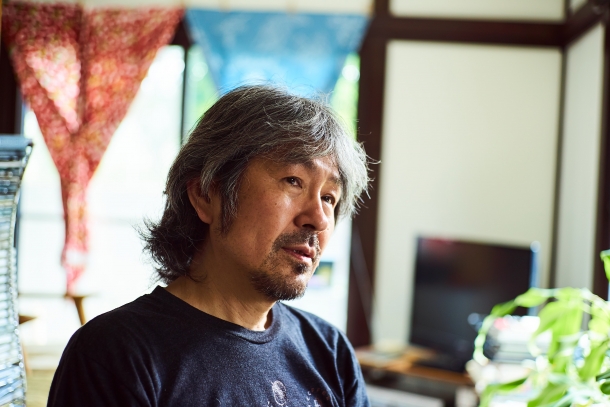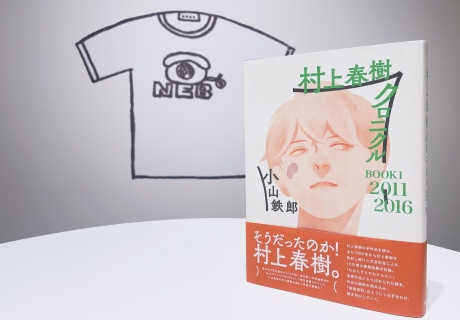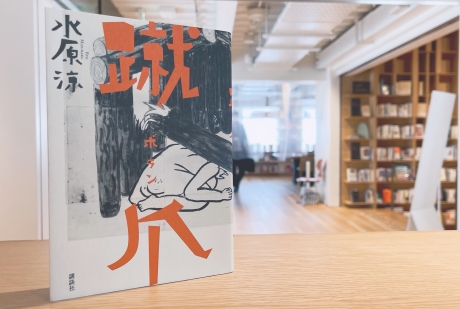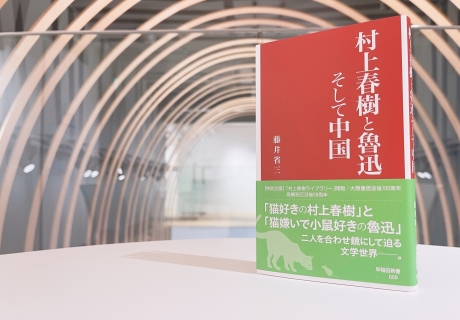

Memories of Things That Never Happened to You
2022.12.12
- Hideo Furukawa
To accompany the opening of the Haruki Murakami Library in November of 2021, we published a series of essays on the Waseda International House of Literature Annex website called Encountering the Literature of Haruki Murakami. This series is a forum for people involved with Murakami’s literature in a variety of ways to talk about their “encounters” with his writing, and what “connections” they feel to it. This November, on the occasion of the first anniversary of the Museum’s opening, we are continuing the series with a new batch of essays.
On the celebratory occasion of beginning the second year of this series, we asked the author Hideo Furukawa to contribute the first essay.
My first encounter with Furukawa’s work was reading his novella Slow Boat to China RMX (Media Factory; translated into English by David Boyd as Slow Boat [Pushkin Press, 2017]). As many of you know, this novella is part of a series of works by young authors written as tributes to famous pieces by Haruki Murakami. It portrays the growth of the first person narrator boku, a story that of course brings to mind the boku of Murakami’s original, but that also evokes a feeling in the reader all its own. Reading this text that feels like being told a story, I couldn’t help but want to read it aloud myself—I found it so memorable, and I’ve been a Furukawa fan ever since.
When we opened the Haruki Murakami Library in 2021, we asked Furukawa to recommend five books related to world literature (please see the end of this essay for these recommendations), and I remember feeling even closer to him as I saw four books I dearly love appear on his list. I was happy that when I later requested that he contribute an essay to this series he immediately agreed.
Without further ado, let us hear from Furukawa himself about his experience reading Murakami literature!
Quan Hui (Editorial Director, Waseda International House of Literature)
Memories of Things That Never Happened to You
Hideo Furukawa
Whenever I write fiction, I find myself facing memory in a strange way. As Murakami himself has also said, it is not like there are only writers who write with a clear idea of “how it will all turn out.” But writers like us are able to follow the right track as we write even if we don’t quite know where we’ll end up. If we’re able to keep a firm sense of “the direction my writing is heading is not wrong,” then our writing will keep advancing until the story reaches its natural conclusion.
When I’m immersed in this sort of writing, I feel I’m somehow excavating my own memories.
It’s as if I’m being told that the yet-unwritten story is already there, at the very bottom of my subconscious, and that I just need to plunge down to the deepest point and recover these lost memories….
These lost memories—they’re yours already.
They’re the memories you have of this story.
Of course, in reality, these are not memories at all. Yet I find myself—or rather, writers like me who have a certain inclination find themselves—knocking—toc toc!— at the door of these “memories” quietly sleeping at the bottom of our souls to awaken them. Or, sometimes, we use an excavating machine to dig them out by force.
There’s another strange thing in this vein that I want to bring up. There are a couple of dozen books I’ve read three, four, or even more times. The kind of books people call “well-loved favorites,” I guess. Whatever the case, there are several Murakami novels that have become this sort of book for me. So, I want you to imagine something like this. You read a book for the first time at the end of your teens, then you read it again in your mid-twenties, then again in your late thirties, then again in your early forties, and then there you are, now in your fifties, and you pick it up yet again: what sort of feeling comes over you as you turn that first page?
First, you think, “Oh? I’ve forgotten everything!”
Even though you’ve read it so many times before, you can’t seem to recall how the story goes…
And then, you think, “Ahh, I’ve seen this before.”
Yes, I remember the streets the protagonist wandered through, the description of them, it’s all coming back. It’s just the way I wandered about in my twenties (or thirties, or whatever)….
And finally, you think, “Wait—this isn’t my story!”
These are streets I—or she, or we—have never actually seen. You realize this and are astonished. The “story” of this novel has burrowed its way into the core (or the corner, or the bottom) of your memory as if it were something you yourself experienced….
When the protagonist of the story is absolutely, completely different from you, the slippage in memory makes it feel almost like you’re reading about experiences from a past life. I am a man, both physically and mentally, but the Murakami short story “Sleep,” which has continued to leave such a strong impression on me from the first time I read it, is written from the first-person perspective of a woman. This woman is someone who can’t sleep. She has been sleepless for seventeen days straight. But in fact, not only is she someone who can’t sleep, she’s also someone who doesn’t sleep.
This predicament, as well as the woman’s interiority, are conveyed in the first person.
In this case, it becomes impossible for me to internalize this female first-person narrated story as my own memory, and yet the vivid “experience” remains in the core (or the corner, or the bottom) of my memory, as if in a former life I’d been the wife of a dentist myself, and I will casually think to myself, “I remember when my husband was a dentist, I didn’t sleep and had a terrifying experience,” and then a second later realize that this in fact never happened to me and I end up astonished once again.
But I did have a terrifying experience. For example, I experienced sleep paralysis. This is something that happens in Murakami’s “Sleep,” and this is a story I’ve read over and over again, four times, eight times….perhaps nine times now altogether. Each time I reread the story, it becomes more and more adept at playing the part of being one of my memories, evoking a feeling in me that I am opening up an old diary, except I’ve never kept a diary like that in my life, which would make it a diary from a previous life.
So what is this terrifying experience I’m talking about?
First: I had a nightmare….
Second: I opened my eyes, but I found I couldn’t move….
Third: I looked down toward my feet and saw an old man I’d never seen before standing there—I clearly saw this….
Finally: This old man held a pitcher of water and was pouring it. On me!
On her.
On us.
Cycling through Japanese first-person pronouns like this—ore for me, atashi for her, watashi for anyone—I am trying to show how the narrator transcends gender or creates a common space where personalities cross over, which is a feature of Japanese. Murakami’s literature is frequently translated, which makes me wonder what happens when it’s read in a context robbing it of that particular me-ness, her-ness, anyone-ness that comes from using ore or atashi or watashi. Though perhaps saying “robbed” is a bit extreme. But there is an unruly richness to the variety of first-person pronouns available in Japanese. In fact, perhaps it’s precisely the erasure of the original’s “odd taste” in this way that constitutes the fundamental meaning of “made into a translation” at all. Whenever I start to think about this problem, I end up concluding that, at least in the case of the translation of Murakami’s literature, the principle by which “something from the original language is lost, but something is also gained by the target language” means that Murakami is being read properly even in translation.
I’m talking about subtraction and addition here.
The calculations of fiction.
The arithmetic of storytelling.
For example, I just talked about the phenomenon of sleep paralysis as it appears in “Sleep.” I briefly explained how this phenomenon is described in the original Murakami short story. But I have no way of really knowing if sleep paralysis is understood as a spiritual phenomenon (as the experience definitely is in the Japanese context) elsewhere, or if, in the context of another country or culture, it would be understood primarily as a physical symptom. If the latter is indeed the case, then when the story is placed into the other language, the “spiritual” aspect is subtracted, which would have the effect of augmenting the feeling that the phenomenon is extremely “symbolic.”
This process is extremely dynamic as well.
For a reader in a cultural and linguistic context where this phenomenon is not equally spiritual, after the process of addition and subtraction is completed, what will appear in its place on the right side of the equal sign?
The symbol of the pitcher.
The phantasm of the old man.
Sleep paralysis is a physical state expressing the absolute lack of voluntary movement, a state under a certain authority. Showing you on the side of being acted upon by authority…
In this way, this “spiritual” episode or story transforms—it becomes symbolic, then fantastical, then even political, as it swoops toward you. Like a specter.
A dynamic monster.
This is what translation is.
This is also what memory is. You, as a reader, encounter sleep paralysis, and then a phantasmatic something that is not sleep paralysis swoops toward you, and the nightmare continues on and on, even into the realm of the real: these facts can take any form at all, but if you, as the reader, internalize them as something like your “own” experiences, once they enter your memory like that, then voila, a tautology arises: this memory has produced a memory.
We tend to think of memories as things that happened in the past, but they exist in the future too.
There are memories acquired only in retrospect. The kinds of things you revise your awareness of, astonished, as you encounter them in the future, thinking, “Wait—I remember that…” Murakami’s novel Hard-boiled Wonderland and the End of the World is one I’ve read however many times during my five decades on this earth. The protagonist of the End of the World part has his eyeball sliced by a knife (its point heated in fire to sterilize it) so he can “read old dreams,” and in the end, both eyeballs get sliced, which acts as a kind of “license” allowing him to act as the Dreamreader. But if he doesn’t avoid contact with the sun, his daily life becomes unmanageable. For when sunlight falls upon him without warning, he is punished.
The punishment takes the form of tears endlessly streaming from his eyes.
That, and great pain.
In other words, the protagonist of the End of the World part of the novel is someone possessing “teary eyes.”
Later, in March of 1995, the sarin gas attack struck the Tokyo subway system, and victims reported that the way they initially realized, “Hey, something strange is happening to my body…”—the first symptom that something was wrong—was the feeling that something was stinging their eyes and their vision was obscured.
This poisonous gas, sarin, is invisible to the human eye.
It’s invisible to the human eye, but it strikes it. Stings it.
And soon, the victims of the attack became people possessing teary eyes.
Haruki Murakami published Hard-Boiled Wonderland and the End of the World more than ten years before the sarin gas attack, and the fact that the attack was portrayed “symbolically” in it—that is, when readers realized that this was a symbol of the attack—this was something that surely occurred years or even decades after the attack took place. That is, in the future.
A “memory” that can only be recognized in its initial retroactive discovery is something that does not exist in the past.
Your memory of it as a reader—as well as my memory of it, also as a reader—always existed in the future.
This experience itself is a type of phantasm, or is perhaps half-fantastical and half-spiritual, but the important thing is the dynamism enfolded within it.
You hold memories within yourself, and when you read books, these memories reveal their truer, more dynamic forms. Their truest functions. This is what the literature of Haruki Murakami has taught me.
(Translated by One Transliteracy, LLC)

Profile
Hideo Furukawa was born in 1966 in Fukushima Prefecture. Since his debut in 1998, he has written all types of fiction, from short-short stories to lengthy novels, while also writing theatrical scripts, critical essays, and non-fiction. He also collaborates with performers from a variety of fields to co-present and co-create works with an emphasis on oral storytelling. His 2003 tribute to Haruki Murakami, Slow Boat to China RMX has been translated into both English and Italian. His most recent publication is the novel Mandāravā X, which came out in March 2022.
His personal website, Furukawa Hideo no mukashi to mirai [The Past and Future of Hideo Furukawa], can be found here: https://furukawahideo.com.
Hideo Furukawa’s Selected Works of World Literature for Connecting the Present to the Future
One Hundred Years of Solitude by Gabriel García Márquez
Immortality by Milan Kundera
in August by William Faulkner
Lenin’s Kisses by Yan Lianke
Tours of the Black Clock by Steve Erickson
For more details, please see the Murakami Library Staircase Bookshelf Database:
https://www.waseda.jp/culture/wihl/en/exihibitions/collection
One TransLiteracy, LLC, is a boutique translation and cultural consultation agency founded by Miyabi “Abbie” Yamamoto, Ph.D. We are a team of highly educated native or native-level bilingual and bicultural experts who provide meticulous translations with linguistic acuity, hone texts for precision and elegance, and provide concise explanations of cross-cultural exchange. The founder, Abbie, grew up in Tsukuba, Japan and received her Ph.D. in Japanese and Korean literatures at the University of California, Berkeley. She is passionate about promoting cross-cultural exchange and everyday practices of intentional inclusion.
Related
-

“Letters from the Haruki Murakami Library”― Rebecca Brown
2025.12.02
-

“Letters from the Haruki Murakami Library”― Camilla Grudova
2025.10.20
-

Historical Consciousness and “Boomerang” Thoughts in the Works of Haruki Murakami
2022.05.08
- Tetsurō Koyama
-

Useful Landscape
2022.03.28
- Ryō Mizuhara
-

My Personal History with the Literature of Haruki Murakami
2022.02.25
- Shōzō Fujii
-

My Encounter with Haruki Murakami, and Taiwan’s
2022.01.27
- Lai Ming-chu
